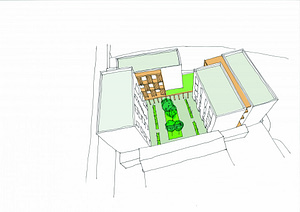By Tom Westwood, Waugh Thistleton Architects, Associate
Marcon Place E8 is Waugh Thistleton’s first built project for Pocket, and Pocket’s first endeavour in Hackney – working together proved a perfect match. We’ve done a good amount of work in the Borough, and Pocket knows the way to getting good quality, fairly-priced housing in the areas that people want to live and work.
At the forefront of Marcon Place E8 was always the commitment to strong design, so we worked closely with the team at Pocket to create smart, thoughtful, and welcoming spaces. What ultimately developed is a design that proves that high density housing can employ natural materials, a human scale and a generosity of communal spaces. It proves to residents that there need not be a compromise in the quality of accommodation required to enjoy the benefits of central London living.
Marcon Place’s 31 homes are arranged in four blocks around a landscaped courtyard which forms the heart of the scheme. This common outdoor area inspires community living and gives Marcon Place that splash of green all tenants desire.
